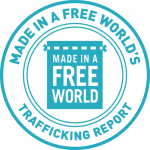 Whilst there’s always a suspicion that CSR is something that receives more lip service than true adoption, it does appear increasingly common that consumers take an ethical interest in how the goods they buy are sourced.
Whilst there’s always a suspicion that CSR is something that receives more lip service than true adoption, it does appear increasingly common that consumers take an ethical interest in how the goods they buy are sourced.
This is particularly strong in environmental areas, but also in the working conditions of employees used to produce many of the garments we consume.
Whilst this may focus primarily on things such as working conditions, health and safety and the like, it’s increasingly casting its gaze upon slavery. Whilst slavery has been abolished in most developed countries for around 200 years now, estimates suggest that there are still around 27 million people used as slaves around the world.
With supply chains increasingly global, this suggests that its an issue that affects most organizations in some way. One attempt to improve this situation is being launched by the US organization Made in a Free World.
They’ve developed a new service called Forced layout Risk Determination and Mitigation (FRDM). The application provides businesses with a means of researching their supply chain and hopefully uncovering any suspicious links within it.
Organizations input details about their business into the system, including the products they make and sell. The platform then trawls its network to reveal both the direct suppliers but also, more importantly, some of the indirect ones.
Each supplier comes with a risk assessment that is then visible to the organization so they can gauge how likely it is that their supply chain are engaged in dubious activities.
If high risk suppliers are uncovered, the site also provides some help and advice on how the company can manage the situation.
The hope is that by working together, progress can be made on improving a situation that continues to fly largely under the radar. The developers want to prod companies to become more interrogative of their supply chain to ensure it remains ethical and above board.
In addition to building the platform, the makers also run a side project that is aimed more at consumers. Called Slavery Footprint, it aims to allow consumers to explore how their own purchases are made.
Users take a questionnaire that quizzes them on the food, electronics and so on that they buy. The site then returns a score that reveals the number of slaves that they believe work in the production of these items.
Users can then undertake various tasks to try and redeem themselves, ranging from somewhat superficial (spreading the word) to the more meaningful (influencing supplies to become more ethical).
We’ve seen similar projects emerge over environmental issues over the years, whilst the aVoid browser plug-in works to alert browsers to products made using child labor. It’s great to see so many projects emerging to make commerce fairer and more ethical.
Interesting project.
I had no idea the problem was still as bad as that. Shocking.